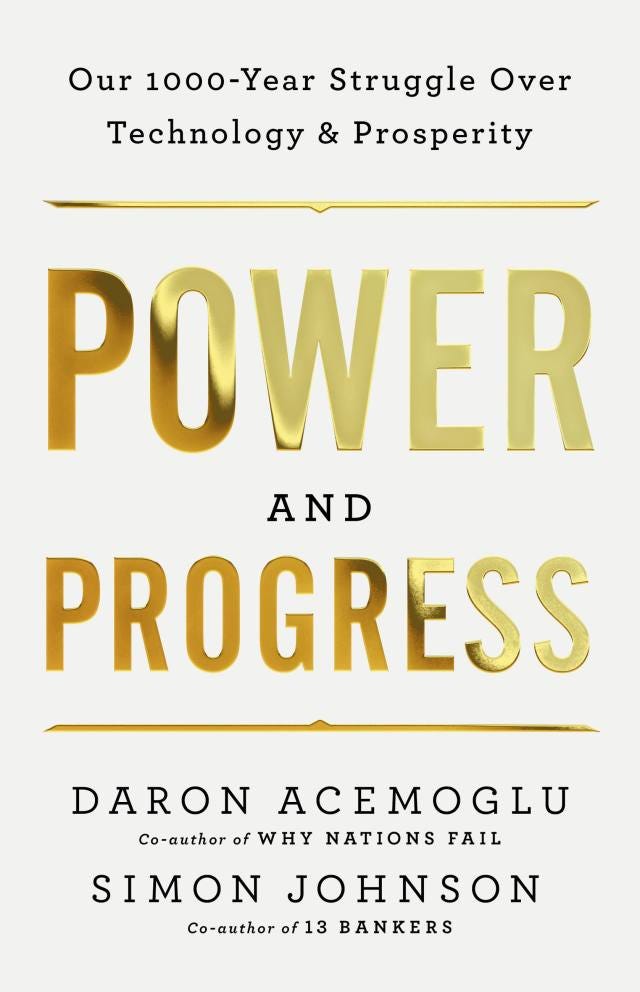🚀 Faster, Please! Week in Review #46
American techno-optimism; the economic impact of climate change; our productivity deficit; and more!
My free and paid Faster, Please! subscribers: Welcome to Week in Review. No paywall! Thank you all for your support! For my free subscribers, please become a paying subscriber today. (Expense a corporate subscription perhaps?)
Melior Mundus
In This Issue
Essay Highlights:
— Is America really a techno-optimist country?
— The 3°C Scenario: What's the economic impact of severe global warming?
— You say 'budget deficit,' I say 'productivity deficit'Best of the Pod
— A conversation with economist Simon Johnson on his new book 'Power and Progress' with Daron Acemoglu
Essay Highlights
🙂 Is America really a techno-optimist country?
I found myself immediately perplexed when reading the opening paragraph of a new book I’d been eagerly anticipating — and, indeed, it really is excellent — Power and Progress: Our Thousand-Year Struggle Over Technology and Prosperity by economists Daron Acemoglu and Simon Johnson. I don’t think a substantial chunk of the American public thinks it’s “heading relentlessly toward a better world, thanks to unprecedented advances in technology.” And if it somehow does, then it must also believe our actions have little impact on the direction given so much bad public policy on immigration, investment, regulation, among other areas. The share of American energy production from nuclear power has been stuck at 20 percent for four decades. Supersonic flight has been banned over the United States for five decades. Oh, yeah, the dominant strain on the American environmental movement is hardly focused on technological solutions — nuclear fission, nuclear fusion, climate engineering — to combating climate change as opposed to envisioning (at best) a solarpunk world of less consumption and economic activity (and people). Even though Silicon Valley and American technology companies remain broadly popular, there are big elements on the left and right that strongly oppose them for reasons of bias and corporate power. Would a techno-optimistic society continue to churn out one dystopian film and television show after another where tech makes our life worse rather than better? Anyway, please check out my chat with Johnson.
🌡 The 3°C Scenario: What's the economic impact of severe global warming?
A new analysis by consulting firm Capital Economics looks at a scenario in which the global average temperature rises by more than 3°C from its pre-industrial average and finds that global GDP would still nearly double by 2050. How could that be possible given all the negative effects predicted by climatologists? From the cautious and meticulous analysis by CE economists David Oxley and Gabriel Ng: "[W]e think global GDP would still nearly double in size between now and mid-century even if the world were to warm by more than we anticipate, largely because developed economies would be affected the least." The good news here is even with a rapid and severe climate outcome over the next 25 years, there’s good reason to think humanity will have even more economic resources and technological capabilities to do something about it — while also preparing for a future where more us can use more energy to turn our dreams into reality. Innovation-driven economic growth is what provides true resilience to America and the world.
📈 You say 'budget deficit,' I say 'productivity deficit'
It seems like little-to-none of the talk about America’s fiscal situation takes into account the possibility of pro-growth policies boosting productivity and economic growth. But we shouldn’t just assume that faster growth, driven by tech progress, will help solve our debt problem, even partially. Our decisions matter. And that’s why this really bothers me: Washington isn’t adequately funding the "Science” part of the bipartisan CHIPS and Science Act. Federal R&D is important for productivity and economic growth. A new study from the Dallas Fed estimates that “government-funded R&D accounts for about one quarter of business-sector TFP growth since WWII, and generally point to substantial underfunding of nondefense R&D.” More science investment should be a policy no-brainer. A new Brookings analysis by Matt Hourihan, Mark Muro, and Melissa Roberts Chapman proposes classifying at least some R&D spending as mandatory funding “outside the normal appropriations process (as opposed to discretionary spending, which is funded through annual spending bills.” This is an idea worth considering, especially given the long-term nature of the innovation process and the value of providing funding certainty.
Best of the Pod
📈 A conversation with economist Simon Johnson on his new book 'Power and Progress' with Daron Acemoglu
Simon Johnson is the Kurtz Professor of Entrepreneurship at MIT. He and Daron Acemoglu are authors of the new book Power and Progress: Our Thousand-Year Struggle Over Technology and Prosperity. Simon is also co-author with Jonathan Gruber of 2019's Jump-Starting America, now out in a new paperback.
In the middle of the Industrial Revolution, late 1800s, what were the changes that we saw that made sure the gains from this economic progress were widely shared?
If we're talking about the United States, of course, the key moment is the mechanization of agriculture, particularly across the West. So people left their farms in Nebraska or somewhere and moved to Chicago to work for McCormick, making the reapers that allowed more people to leave their farms. So you needed a couple of things in that. One was, of course, better sanitation and basic infrastructure in the big cities. Chicago grew from nothing to be one of the largest cities in the world in period of about a decade and a half. That requires infrastructure that comes from local government. And then there's the key piece, Jim, which is education. There was what's known as a “high school movement.” Again, very local. I don't think the national government knew much about it until it was upon them. [It was] pushing to educate more people in basic literacy and numeracy and to be better workers. At the same time, we did have from the national government, of course particularly in the context of the Civil War, the land grant universities, of which MIT is very proudly one of by the way — one of the only two that became private for various reasons. But we were initially founded to support the manufacturing arts in Massachusetts. That was a state initiative, but it was made possible by a funding arrangement, a land swap, actually, with the federal government.






